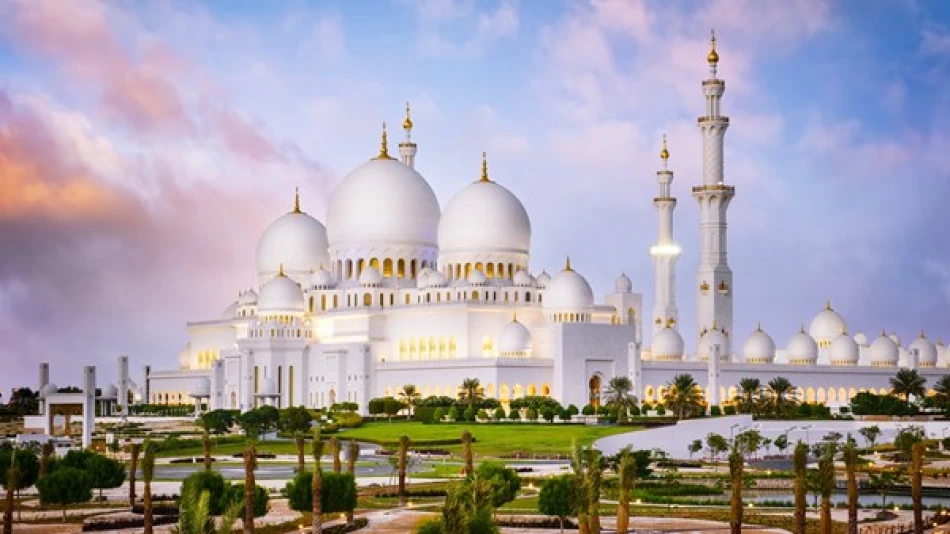
Abu Dhabi's Iconic Landmarks Captivate Global Travelers for 2025
Abu Dhabi's Ferrari World Claims Global Crown as TripAdvisor's Top Theme Park Destination
Abu Dhabi has cemented its position as a premier global tourism hub, with Ferrari World Abu Dhabi securing the number one spot on TripAdvisor's 2025 list of the world's most attractive theme parks and entertainment cities. Meanwhile, the Sheikh Zayed Grand Mosque climbed two positions to rank eighth globally among top tourist landmarks, leading the Middle East region after analysis of over 8 million attractions worldwide.
Ferrari World's Engineering Marvel Drives Global Recognition
Ferrari World Abu Dhabi's top ranking reflects more than just thrills—it represents the UAE's strategic pivot toward diversified tourism revenue streams. The world's first Ferrari-branded theme park houses over 44 attractions, including the planet's fastest roller coaster and highest non-inverted loop structure. This achievement positions Yas Island as a serious competitor to established entertainment capitals like Orlando and Anaheim.
The park's success signals a broader trend in the Gulf region, where oil-dependent economies are investing heavily in tourism infrastructure. Unlike seasonal destinations, Abu Dhabi's year-round appeal and strategic location between Europe and Asia create sustainable competitive advantages that traditional theme park markets struggle to replicate.
Yas Island's Tourism Ecosystem Matures
Yas Island's comprehensive entertainment portfolio—featuring three major indoor theme parks (Ferrari World, Warner Bros. World, and SeaWorld), plus Clymb Abu Dhabi and Yas Waterworld—recorded over 38 million visits in 2024, marking 10% growth year-over-year. This integrated approach mirrors Singapore's Sentosa Island model, where clustering attractions creates extended visitor stays and higher per-capita spending.
The island's success reflects careful market positioning. While Disney and Universal focus on family demographics, Yas Island targets affluent millennials and Gen Z travelers seeking Instagram-worthy experiences and luxury amenities—a demographic with significant spending power in emerging markets.
Cultural Tourism Gains Momentum Through Sheikh Zayed Grand Mosque
The Sheikh Zayed Grand Mosque's eighth-place global ranking among major landmarks represents a significant achievement for cultural tourism in the region. Welcoming 6.581 million visitors in 2024—81% from abroad—the mosque demonstrates how architectural grandeur combined with cultural accessibility can compete with established icons like the Taj Mahal or Sagrada Familia.
This ranking reflects a growing global appetite for authentic cultural experiences beyond traditional European and American destinations. The mosque's multilingual guided tours and inclusive visitor policies have created a template for how religious sites can serve as cultural bridges while maintaining their sacred character.
Strategic Investment in Soft Power
The mosque's success extends beyond tourism metrics—it represents the UAE's broader soft power strategy. By positioning Islamic architecture and culture as globally accessible rather than exclusionary, the UAE differentiates itself from regional competitors and builds cultural capital that supports diplomatic and economic objectives.
Tourism Economics Signal Structural Shift
The World Travel and Tourism Council data reveals telling trends: leisure tourism now comprises 84.7% of UAE's total tourism demand, up from 78.8% in 2019. This shift toward experiential travel benefits the UAE's strategy of building world-class attractions rather than relying solely on business travel or transit passengers.
International visitor spending is projected to reach a record AED 228.5 billion in 2025, representing 37% growth over 2019 peaks. This recovery trajectory outpaces most global destinations, suggesting the UAE's tourism investments are capturing market share from traditional competitors.
Diversification Strategy Pays Dividends
With international tourists contributing 79% of tourism spending versus 21% domestic, the UAE has successfully built a globally attractive destination rather than merely a regional hub. This international appeal provides resilience against regional economic fluctuations while generating foreign currency revenues that support the broader economic diversification agenda.
Competitive Implications for Global Tourism
Abu Dhabi's TripAdvisor rankings signal intensifying competition in the global tourism market. Traditional destinations face new challenges from well-funded Gulf states offering world-class infrastructure, strategic geographic positioning, and government backing for ambitious tourism projects.
The success of both Ferrari World and Sheikh Zayed Grand Mosque demonstrates how emerging destinations can leapfrog established competitors by combining cutting-edge facilities with authentic cultural experiences. This dual approach—technological innovation paired with cultural depth—creates a sustainable competitive advantage that pure entertainment or heritage destinations struggle to match.
For tourism investors and destination managers worldwide, Abu Dhabi's model suggests that success requires integrated planning, substantial capital investment, and clear positioning strategies that differentiate from established competitors rather than merely imitating them.
Most Viewed News

 Layla Al Mansoori
Layla Al Mansoori






